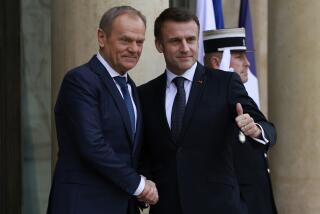Germany’s Foreign Policy Wears a Uniform
- Share via
BERLIN — The German public has long been apprehensive about sending soldiers to foreign lands, but this nation’s aspiration to become an influential global voice has troops on the march in peacekeeping missions from Kosovo to Afghanistan.
History is never far from the present here, and the Nazi era often imbues political and military debates.
Still, Chancellor Angela Merkel is eager to lift Germany’s international profile. Her administration, like that of her predecessor, Gerhard Schroeder, is using peacekeepers to enhance foreign policy and show that the Nazi and Cold War legacies have a diminishing hold on a younger generation of politicians.
What remains to be seen is whether this resolve will waver if large numbers of German troops are killed and public support tapers.
“We have learned that whether we like it or not, we will be more global in our outlook and share the responsibility,” said Eberhard Sandschneider, director of the German Council on Foreign Relations. “The net effect is that Germany’s international reputation is growing.”
Opposition politicians fear that the moral stature the country honed after World War II is jeopardized by military engagements in places such as Afghanistan, where 2,812 German soldiers are vital to the multinational force.
Critics say the mission makes Germany, which opposed the U.S.-led invasion of Iraq, a target for Al Qaeda. They argue that such interventions could squander Berlin’s goodwill in the Muslim world if they are perceived as supporting U.S. foreign policy.
The military’s foray into Lebanon is perhaps its most sensitive undertaking. German troops are part of a 15,000-strong United Nations force deployed to the country after this summer’s war between Israel and Hezbollah fighters. To avert the potential for clashes with Israeli soldiers that could rouse memories of the Holocaust, Germany is sending its navy to patrol the Lebanese coast.
Merkel said the force was part of Germany’s “particular responsibility” for Israel’s right to exist.
“The Lebanon mission is not about breaking foreign policy taboos, which we have installed for good reasons after the time of the Nazis,” Foreign Minister Frank-Walter Steinmeier told parliament two weeks ago before it approved the deployment of eight ships and as many as 2,400 sailors and support staff. “No, it’s about credibility. It’s about recognition of a normality which doesn’t protect us from commitment any longer.”
The military’s role in that commitment troubles German pacifists. One newspaper caricatured Merkel wearing Rambo-like fatigues and carrying an automatic rifle.
Werner Hoyer, a member of the opposition Free Democrats, said, “I don’t think it is very wise to put our political capital at stake with a military contribution. We do have a political capital -- also a capital of confidence -- on both sides of the Middle East.”
Interior Minister Wolfgang Schaeuble said the mission might curtail terrorism, soothing words to a public unnerved by the arrests in August of two Lebanese men accused of planting suitcase bombs on German trains. The explosives didn’t detonate, but the investigation has led to extremist elements in the Middle East.
“By preventing new conflicts, we avert the causes of radicalization and the risks of terrorist attacks in Europe, including in Germany,” Schaeuble told the German news media.
The Lebanon deployment underscored concerns about restructuring the military to meet the intricacies of a post-Cold War world. In addition to troops in the Balkans and Afghanistan, German forces are in Congo, Sudan, Georgia and the border region between Eritrea and Ethiopia. A naval contingent patrols the Horn of Africa. The German armed forces have 250,770 troops.
Military budgets have not kept pace with the peacekeeping tasks. Defense spending accounts for 1.4% of the nation’s gross domestic product, one of the lowest of Western nations.
A recent poll showed that 64% of Germans opposed increasing the military budget, a dynamic that reveals the public’s 60-year reluctance to build a large army and its preference to protect social programs from spending cuts.
After German reunification, Berlin favored sending money and redevelopment aid instead of troops to crisis spots. In the early 1990s, the country dispatched small contingents of humanitarian and peacekeeping troops to Somalia and Bosnia.
But the Kosovo war in 1999, when German troops deployed on their first foreign offensive action since World War II, broke this nation’s psychological restrictions on blending its military with its foreign policy.
That attitude shift was instigated by Schroeder and his foreign minister, Joschka Fischer, who argued that Germany had to accept more international burdens to be recognized as an emerging power. The strategy, largely followed by Merkel, has helped advance Germany’s bid for a permanent seat on the U.N. Security Council.
“There’s no reason not to participate in military missions,” said Walther Stuetzle, a political analyst and former Defense Ministry official. “We are a member of the U.N. and, domestically, it basically goes down positively because it can be sold as peacekeeping.”
These missions have so far come with limited casualties. Since 1993, 52 soldiers have died in overseas operations, but only one in combat.
“Most of our soldiers have been killed in things like helicopter crashes and car accidents,” Sandschneider said. “We’re not used to having our soldiers coming home dead. The media are reluctant to show this.”
He added that public support for peacekeeping missions might fade if Germans start asking “what may happen to our reputation and start seeing soldiers coming home in coffins.”
*
More to Read
Sign up for Essential California
The most important California stories and recommendations in your inbox every morning.
You may occasionally receive promotional content from the Los Angeles Times.











